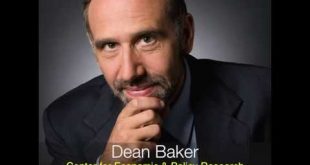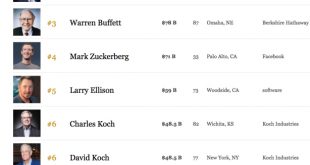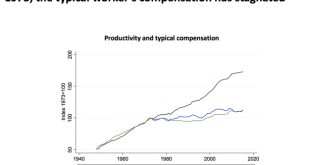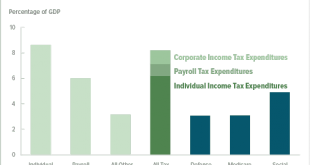from C.P. Chandasekhar News that the US economy grew at 3 per cent during the hurricane-blighted third quarter of 2017, close to the 3.1 per cent recorded in the previous quarter, has once more revived claims that the world economy has left the Great Recession behind. There is one reason to discount this claim. Back to back 3 per cent annualized rates of growth in consecutive quarters has been observed more than once since the 2008 crisis. In fact, as recently as the second and third...
Read More »GOP Tax Reform discussed by economy expert, Dean Baker
Christian Democrats of America director Christina Forrester speaks with Dean Baker of the Center of Economic and Policy Research, a non-partisan organization, at the We the People Summit in Phoenix, AZ, who explains why the GOP "tax reform" bill is a scam on the poor and middle class to benefit the rich. Part 1 of video series interviews, follow us for more! Please share! Video Produced & Edited by Carol "THE SNEED" Sneed for Christian Democrats of America
Read More »Monopoly men*
from David Ruccio Wealth inequality in the United States has reached such extreme levels it is almost impossible to put it into perspective. But the folks at the Institute for Policy Studies (pdf) have found a novel way, by comparing the fortunes of the 400 wealthiest Americans to the meager assets of everyone else. Here’s what they found: The three wealthiest people in the United States—Bill Gates, Jeff Bezos, and Warren Buffett—now own more wealth than the entire bottom half of the...
Read More »Doomed to repeat?
from Peter Radford One of the great pleasures of living here in southern Vermont is that we have a terrific local bookshop. I go there simply to absorb that book shop vibe unattainable in the bits and bytes of Amazon. And like all good bookshops this one throws up surprises. About three weeks ago I was browsing the small business and economics section and found a book by Heinz Kurz. It’s his “Economic Thought, A Brief History” I recommend it for all of you who want to understand the...
Read More »Why Krugman and Stiglitz are no real alternatives to mainstream economics
from Lars Syll Little in the discipline has changed in the wake of the crisis. Mirowski thinks that this is at least in part a result of the impotence of the loyal opposition — those economists such as Joseph Stiglitz or Paul Krugman who attempt to oppose the more viciously neoliberal articulations of economic theory from within the camp of neoclassical economics. Though Krugman and Stiglitz have attacked concepts like the efficient markets hypothesis … Mirowski argues that their attempt...
Read More »Not with a bang but with a (prolonged) whimper
from Jayati Ghosh It is probably obvious to everyone that global capitalism is in dire straits, notwithstanding the brave talking up of output recovery that now characterises almost every meeting of the international governing elite. Even so, discussions of the end of capitalism still typically seem overstated and futile, not least because those hoping and mobilising for bringing in an alternative system are everywhere so scattered, weak and demoralised. In effect, capitalism is the only...
Read More »Desperately seeking a link between wages and productivity
from David Ruccio Everyone, it seems, now agrees that there’s a fundamental problem concerning wages and productivity in the United States: since the 1970s, productivity growth has far outpaced the growth in workers’ wages.* Even Larry Summers—who, along with his coauthor Anna Stansbury, presented an analysis of the relationship between pay and productivity last Thursday at a conference on the “Policy Implications of Sustained Low Productivity Growth” sponsored by the Peterson Institute...
Read More »Completing the Circle: From GD ’29 to GFC ’07
from Asad Zaman Karl Marx said that “The advance of capitalist production develops a working class which by education, tradition and habit looks upon the requirements of that mode of production as self-evident natural laws.” Modern economic theory is a tool of central importance in making the laborers and the poor accept their own exploitation as natural and necessary. As explained in greater detail in the next lecture (AM09), Economic Theory argues that distribution of income is FAIR –...
Read More »Taxes: 1970’s Redux?
from Peter Radford Taxes. What a problem. I was going to start by saying something about our current national debate about taxes, but that would have been an untruth. We are not having a debate. Instead we are all sitting on the sidelines whilst the Republican Party desperately tries to cobble together a tax plan in order to fulfill one of the promises it made during last year’s election. That this would be the only major promise thus fulfilled we can ignore for now. Instead, I think I...
Read More »Where has all the surplus gone?
from David Ruccio Thanks to the release of the so-called Paradise Papers, and the additional research conducted by Gabriel Zucman, Thomas Tørsløv, and Ludvig Wier, we know that a large share of the surplus captured by corporations is artificially shifted to tax havens all over the world. This, of course, is on top of the conspicuous tax evasion practiced by the individual holders of a large portion of the world’s wealth. Thus, for example, U.S. multinational corporations now claim to...
Read More » Real-World Economics Review
Real-World Economics Review






